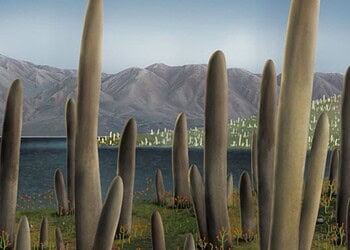Forests around the world are feeling the shifts in global climate and atmospheric chemistry, a new paper reports. Trees are growing shorter, and there are fewer and fewer older ones around, as tree mortality is on the rise due to a conflux of factors.

These changes have a profound effect on the overall makeup of forest ecosystems, and can potentially have ramifications for all other ecosystems on the planet.
Tree troubles
“This trend is likely to continue with climate warming,” said Nate McDowell, the study’s lead author and a researcher at the U.S. Department of Energy’s Pacific Northwest National Laboratory.
“A future planet with fewer large, old forests will be very different than what we have grown accustomed to. Older forests often host much higher biodiversity than young forests and they store more carbon than young forests.”
They used satellite imagery and available research on forests to conclude that the average size of trees has been declining over the last century. The changes in trees’ lifecycles are being driven by rising average temperatures and growing concentrations of atmospheric CO2 gases.
Greater availability of carbon in the air makes for more fertile times, as plants use this element to develop and grow. However, higher average temperatures are placing increased stress on the plants and increasing the frequency of damaging events such as wildfires, droughts, and damaging winds — which increase tree mortality. Deforestation also factors in here, further increasing tree mortality and inducing changes in the age and structure of forests.
According to the team, these elements have already induced a noticeable change in the makeup and average age of forests. Such human-induced changes will most likely continue in the foreseeable future, they add, leading to ever-shrinking old-growth forests globally.
Forest life
The makeup and age of individual forests are closely interlinked characteristics, and they’re primarily the product of three different factors: recruitment, which is the addition of seedlings to a community, growth rates, as determined by the net increase in biomass/carbon, and mortality rates.
“Mortality is rising in most areas, while recruitment and growth are variable over time, leading to a net decline in the stature of forests,” said McDowell. “Unfortunately, mortality drivers like rising temperature and disturbances such as wildfire and insect outbreaks are on the rise and are expected to continue increasing in frequency and severity over the next century.”
“So, reductions in average forest age and height are already happening and they’re likely to continue to happen.”
Old-growth forests have different characteristics compared to young ones. They’re different ecosystems, harboring a greater diversity of plants and animals, as well as more biomass overall. They have a greater ability to process atmospheric carbon, and they store more of it. The shift from old- to young-growth forests around the world “has consequences on biodiversity, climate mitigation, and forestry,” McDowell adds.
The problem is further exacerbated by the fact that large areas of old-growth forests lost over the last century weren’t replaced by young forests, but by completely different landscapes and ecosystems, such as agricultural, pastoral, or industrial areas.
Humanity takes a toll

As our effects on global ecological mechanisms increases, the toll these changes take on forests will increase as well. The team explains that higher concentrations of CO2 only seem to benefit young forests that have abundant nutrients and water. Given that many fertile areas of the world have issues with the supply of either or both of those essential elements, the increase in atmospheric CO2 only brings a modest benefit to forests.
At the same time, higher temperatures promote freak, damaging weather events, and reduce plants’ ability to photosynthesize. The team explains that this temperature-induced impairment is one of the leading causes of the trees’ reduced size. Droughts associated with climatic shifts further impact forest mortality.
Finally, wood harvesting has one of the most profound effects on global forest age seen in the study. Where forests are re-established on harvested land, the trees are smaller and biomass is reduced.
All in all, the findings make it loud and clear that trees are struggling around the world. Forests are seen as an important part of our current global warming mitigation strategies (which are far from sufficient as it is), and the findings showcase that we may have overestimated how much they can help given their current, damaged state.
The paper “Pervasive shifts in forest dynamics in a changing world” has been published in the journal Science.






